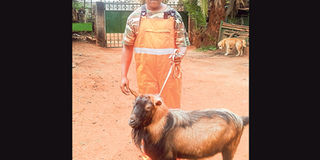Agriprenuer milks handsome profits from goats

Cyrus Ngumo with a billy goat in his farm in Kiambu. He started keeping goats first as a means of providing milk for his dogs which he then considered his main business. PHOTO | WINNIE LELEI | NMG
What you need to know:
- The 54-year-old father of five rears goats for milk, with the animals offering him some handsome profits.
- The nannies produce an average of three litres a day, offering him 21 litres.
- Apart from buying feeds, medicine and supplements as well as routine check-ups, he also pays someone to groom them and clean the pens every twice a week.
- The farmer keeps a bookshelf of farming material he buys from book stores and agriculture exhibitions.
Walking into Cyrus Ngumo's compound in Kirigiti, Kiambu County, one is usually met with clucking sounds of chickens.
In 1996, Ngumo ventured into the business of breeding dogs, which saw him diversify into other types of farming, including chicken and goat rearing.
The 54-year-old father of five rears goats for milk, with the animals offering him some handsome profits.
Ngumo started keeping goats first as a means of providing milk for his dogs which he then considered his main business.
“I bought a lactating goat at Sh5,000 from a neighbour. Six months later, I needed another goat since the other one had dried off. And that is how my herd increased,” says Ngumo, adding that he built a goat pen at Sh50,000.
Soon, the two goats began to reproduce and the number of people seeking to buy his milk from him increased as the farmer realised the medicinal value attached to goat milk was fuelling demand.
Currently, Ngumo boasts of seven nannies on his quarter-acre farm, a billy and several kids, with the animals being German Alpine and the Toggenburg breeds. The nannies produce an average of three litres a day, offering him 21 litres.
Of this, he feeds six to the kids and puppies and the rest is sold at Sh200 per litre mainly to relatives of patients at hospitals, who take to them.
“Goats feed mostly on dry matter that include maize and wheat bran and dairy meal. Once in a while, I feed them green vegetation such as napier and plantain leaves, in addition to supplements such as vitamins, sodium and selenium, to guard them against the deficiency which causes infertility, abortion or stillbirths,” says Ngumo, who initially run a timber business at Gikomba in Nairobi.
INFORMATIVE VIDEO CLIPS
Apart from buying feeds, medicine and supplements as well as routine check-ups, he also pays someone to groom them and clean the pens every twice a week. The practice of has kept his compound free of animal odour.
Ngumo has equipped himself with knowledge on the different goat breeds, feeding, pests and diseases and housing.
“I have learnt a lot by reading books and watching clips on how to rear the animals, their feeding needs and the prevention and cure of most probable diseases,” says Ngumo, who also sells the animals for at least Sh10,000 each.
The farmer keeps a bookshelf of farming material he buys from book stores and agriculture exhibitions. He also receives informative video clips from a number of acquaintances living abroad which have come in handy for his farming ventures.
Ngumo, whose target is to have 50 dairy goats, says among the challenges he contends with are expensive food, supplements and medicine for the animals.
Dr Kenneth Wameyo, the secretary, Kenya Veterinary Association, says that sanitation, decontamination and ventilation in the pens are necessary to rid mites off goats, which cause both health and economic losses.
“In zero-grazing systems, goats are less exposed to parasites and infectious diseases as compared to those in free-range. The restricted movement of animals minimises their chances of coming into contact with pathogens.”
The danger in zero grazing units, according to Dr Wameyo, lies in poor ventilation which causes respiratory diseases, the leading cause of death in goats.
He notes that goat milk has higher protein, fat and phosphate. It differs from cow in terms of its higher digestibility and is a substitute for those who suffer from cow milk allergy. Its products are a source of protein, phosphate and calcium.




